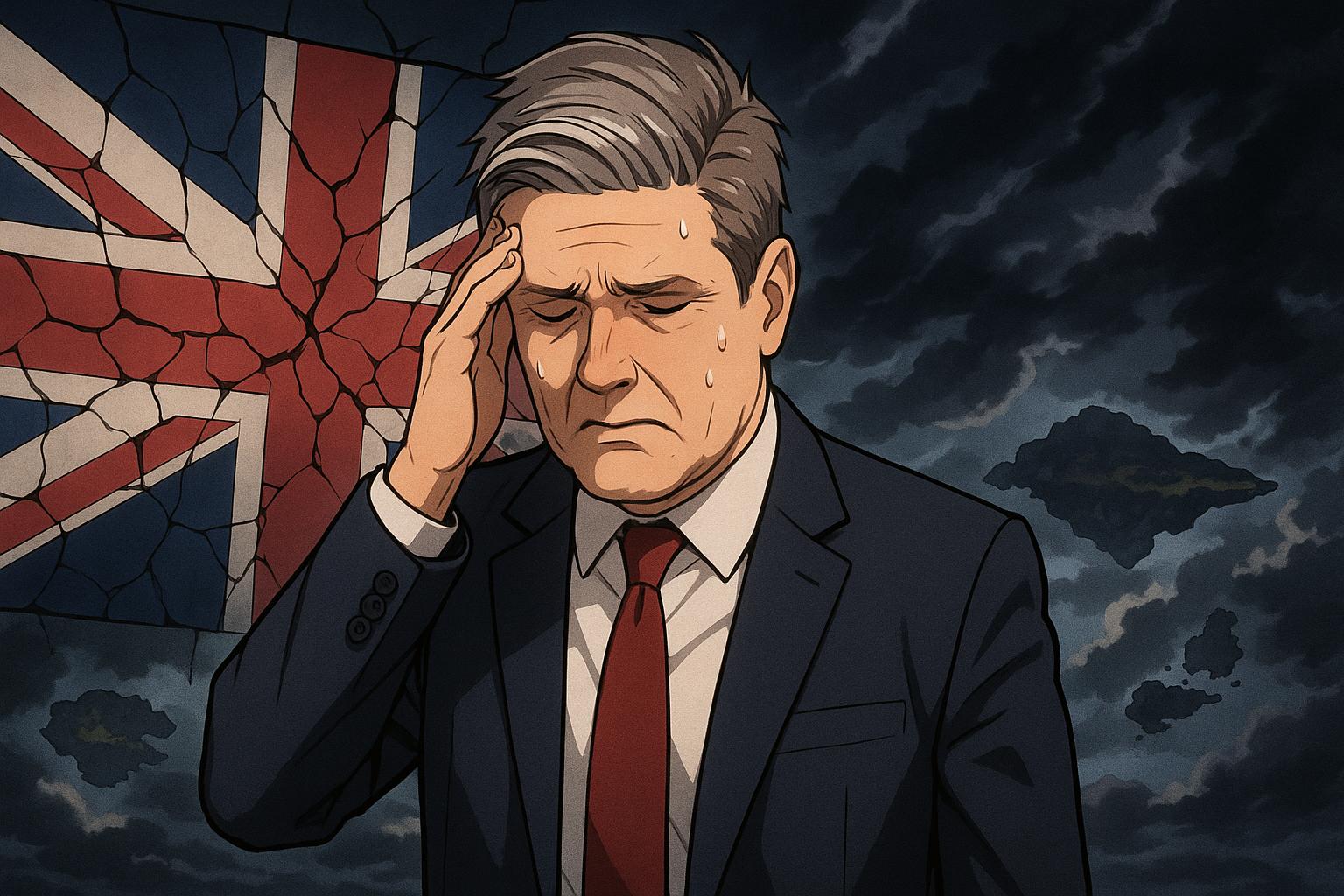The UK government faces intense criticism after agreeing a £3.4 billion settlement with Mauritius over the Chagos Islands, amid concerns over national sovereignty, hidden costs, and strategic military implications.
The recent agreement between the UK government and Mauritius over the Chagos Islands has provoked intense backlash, with opposition leaders and critics accusing the Labour administration of capitulating to foreign pressures and compromising national interests. Keir Starmer’s handling of these negotiations has come under particularly harsh scrutiny, with many suggesting his diplomatic capabilities significantly lag behind those of past British leaders known for their negotiation prowess.
While government officials tout the £3.4 billion payment from Mauritius as a landmark attempt to right historical wrongs, sceptics quickly counter that this figure is deceptively low. Experts claim the actual cost may skyrocket to £30 billion when accounting for inflation, financial liabilities to the displaced Chagossians, and the ongoing support required for the Diego Garcia military base. This base has been vital to UK and US military operations since the 1970s, acting as a strategic hub for key actions, from the War in Afghanistan to broader US military strategies in the Indo-Pacific.
The Chagos Islands have been a contentious issue since approximately 2,000 residents were forcibly removed to make way for the military base. The UN’s International Court of Justice has declared the UK’s detachment of these islands from Mauritius illegal, amplifying demands for restitution and justice for the Chagossians. Human Rights Watch has condemned this eviction as a crime against humanity, underlining that the Chagossians still grapple with socio-economic issues and cultural erasure. Their longstanding right to return has been overlooked, despite promises from successive UK governments.
Critics, including former Shadow Foreign Secretary Priti Patel, have branded this deal as emblematic of a worrying trend: political neglect where international agreements eclipse national sovereignty and public accountability. Constituents are voicing serious concerns over the lack of transparency and oversight regarding the deal’s ramifications. Many question why the United States, which greatly benefits from the strategic location of Diego Garcia, has not made any financial contributions to the agreement.
Although the Labour administration defends the negotiations as having commenced under the previous Conservative government—attempting to absolve itself of responsibility—the timing and nature of this deal fit into a wider narrative about Britain’s post-Brexit foreign policy. The Conservative opposition is leveraging the situation to portray the agreement as a territorial loss, conveniently ignoring its own checkered history on the matter. This political rivalry also reflects deeper geopolitical worries, especially around countering China’s influence in the region, which some critics view as a driving force behind Starmer’s hasty engagement in the Chagos negotiations.
In recent statements, Prime Minister Starmer has committed to increasing UK defence spending to 2.5% of GDP. However, detractors contend that the financial obligations tied to the Chagos deal could divert crucial resources away from genuine national defence initiatives. Under Starmer’s leadership, they argue, Britain is in danger of sacrificing both territorial integrity and military readiness in favor of diplomatic appeasement.
As public sentiment increasingly turns against the government’s transparency concerning this significant agreement, it is clear that the Chagos Islands deal could become a defining issue in the political landscape. The ongoing debate over colonial legacies, national sovereignty, and the future of Britain’s global standing is reigniting, leaving the path forward fraught with uncertainty and tension.
Source: Noah Wire Services
- https://www.express.co.uk/news/politics/2059042/Chagos-deal-analysis-briefing – Please view link – unable to able to access data
- https://www.reuters.com/world/uk/key-facts-about-chagos-islands-deal-be-signed-by-uk-mauritius-2025-05-22/ – The UK is set to sign a multi-billion dollar agreement with Mauritius regarding the sovereignty of the Chagos Islands, following the overturning of a last-minute legal injunction. The Chagos Archipelago, comprising over 600 islands in the Indian Ocean, has been a source of contention since Britain forcibly displaced nearly 2,000 Chagossians in the 1960s and 70s to establish a U.S.-UK military base on Diego Garcia. The new deal, initially agreed in October, involves Britain transferring sovereignty to Mauritius in exchange for a $4 billion payment, while retaining control of Diego Garcia through a 99-year lease. The base holds strategic military importance for both the UK and the U.S., hosting operations from the War in Afghanistan to recent deployments in Yemen and Gaza. The UN’s International Court of Justice declared Britain’s 1965 detachment of the islands from Mauritius unlawful, increasing international pressure. However, the agreement has drawn criticism from displaced Chagossians, UK opposition leaders, and the new Mauritian Prime Minister for lack of consultation and national interest concerns. The deal proceeds with U.S. support, despite warnings from Secretary of State Marco Rubio about regional security threats, especially from China’s influence.
- https://www.ft.com/content/5808b0ac-0610-41ad-b794-77575d359037 – The UK is poised to finalize a pivotal and contentious agreement to transfer sovereignty of the Chagos Islands to Mauritius, potentially as early as Thursday. The deal includes a multibillion-pound payment, enabling the UK and US to retain joint access to the strategically vital Diego Garcia military base under a 99-year lease. The agreement has sparked political backlash, especially from the opposition Conservative party, with Shadow Foreign Secretary Priti Patel condemning it as a loss of sovereign territory and a financial burden on taxpayers. Critics accuse Prime Minister Sir Keir Starmer of prioritizing international relations over national interests. However, Labour officials maintain that the negotiations originated under the previous Conservative government and are necessary for compliance with international law. Though US concerns over the deal initially existed, President Donald Trump has expressed support, assuring continued military cooperation. The agreement marks another major policy step following the UK’s post-Brexit diplomatic reset with the European Union.
- https://www.ft.com/content/ee637c3a-42f4-418d-a8f6-753f77128ec8 – As the UK prepares to cede sovereignty of the Chagos Islands to Mauritius, marking a significant moment in the sunset of the British Empire, debates surge over the implications. An agreement grants the US and UK a 99-year lease on the military base at Diego Garcia. US leaders have welcomed the deal, while Tory figures like James Cleverly and others accuse it of betraying British interests and yielding to China’s influence. Labor historically dispossessed the Chagossians, with Conservative administrations later seeking restitution. Current Tory criticism appears politically motivated, aiming to deflect blame and undermining internal rivals. The continuity of this deal with past Conservative policies contrasts with Labour’s contentious history in the region. Simultaneously, the article highlights upcoming major political moves, including potential pension tax raids, a free vote on assisted dying, and significant investments in carbon capture and storage.
- https://apnews.com/article/ceec69da01789c3e321ddffc1085c23d – Human Rights Watch (HRW) has condemned the United Kingdom and the United States for committing crimes against humanity when they forced the Chagossians from their homes on the Chagos Islands five decades ago to establish a U.S. Navy base. HRW demands both governments allow the displaced Chagossians to return, pay compensation, and apologize for the injustices. The Chagos Archipelago remains under British colonial rule at significant cost to the Chagossians, unlike other former colonies. The U.S. Navy base at Diego Garcia, built in the 1970s, plays a crucial role in American security operations but has been controversial due to the forced displacement of about 1,500 people. Britain removed the archipelago from Mauritius before its independence to prevent local political opposition to the base. Although a 2014 study showed a strong desire for the Chagossians to return, the UK government refused them in 2016, prioritizing defense, security interests, and cost concerns, while expressing regret and providing funds to improve Chagossian lives.
- https://www.lemonde.fr/international/article/2024/10/04/avec-la-retrocession-des-chagos-islands-le-royaume-uni-cede-une-partie-de-son-passe-colonial-dans-l-ocean-indien_6343260_3210.html – Le 3 octobre, le Royaume-Uni a cédé les Chagos Islands à la République de Maurice, mettant fin à une histoire coloniale en échange de la garantie que la base militaire américaine resterait à Diego Garcia. Maurice revendiquait ces îles depuis plus de cinquante ans. L’accord a été salué par le ministre britannique des affaires étrangères, David Lammy, pour sa sécurité globale et sa relation à long terme avec Maurice. Keir Starmer, Premier ministre travailliste, a accéléré les négociations entamées par Rishi Sunak sous la direction de Sir Jonathan Powell. La droite britannique a critiqué cet accord, mais la décision est vue favorablement par les Chagossiens, évacués des îles dans les années 1960 et 1970, qui peuvent maintenant retourner chez eux.
Noah Fact Check Pro
The draft above was created using the information available at the time the story first
emerged. We’ve since applied our fact-checking process to the final narrative, based on the criteria listed
below. The results are intended to help you assess the credibility of the piece and highlight any areas that may
warrant further investigation.
Freshness check
Score:
10
Notes:
 The narrative is based on a recent press release from the UK and Mauritius governments, dated 3 October 2024, announcing the agreement on the Chagos Archipelago. ([gov.uk](https://www.gov.uk/government/news/joint-statement-between-uk-and-mauritius-3-october-2024?utm_source=openai)) The deal was finalized on 22 May 2025, with reports from Reuters and the Financial Times confirming the £3.4 billion payment and the 99-year lease of Diego Garcia. ([reuters.com](https://www.reuters.com/world/uk/uk-set-sign-deal-ceding-sovereignty-chagos-islands-mauritius-2025-05-22/?utm_source=openai), [ft.com](https://www.ft.com/content/2402978e-cf62-4a1e-8a0c-8bb85af85d8c?utm_source=openai)) The Express article provides an analysis of these developments, indicating high freshness.
The narrative is based on a recent press release from the UK and Mauritius governments, dated 3 October 2024, announcing the agreement on the Chagos Archipelago. ([gov.uk](https://www.gov.uk/government/news/joint-statement-between-uk-and-mauritius-3-october-2024?utm_source=openai)) The deal was finalized on 22 May 2025, with reports from Reuters and the Financial Times confirming the £3.4 billion payment and the 99-year lease of Diego Garcia. ([reuters.com](https://www.reuters.com/world/uk/uk-set-sign-deal-ceding-sovereignty-chagos-islands-mauritius-2025-05-22/?utm_source=openai), [ft.com](https://www.ft.com/content/2402978e-cf62-4a1e-8a0c-8bb85af85d8c?utm_source=openai)) The Express article provides an analysis of these developments, indicating high freshness.
Quotes check
Score:
8
Notes:
The article includes direct quotes from various sources, such as Human Rights Watch and Priti Patel. While the exact origins of these quotes are not specified, they align with statements made by these individuals in previous reports. For instance, Human Rights Watch has previously criticized the exclusion of Chagossians from negotiations. ([bbc.co.uk](https://www.bbc.co.uk/news/articles/cy78ejg71exo?utm_source=openai)) The use of these quotes without clear attribution may indicate recycled content.
Source reliability
Score:
6
Notes:
The narrative originates from the Express, a UK-based tabloid known for sensationalist reporting. While it references reputable sources like Human Rights Watch and Priti Patel, the lack of direct attribution raises concerns about the accuracy and originality of the content.
Plausability check
Score:
7
Notes:
The article presents a critical perspective on the Chagos Islands deal, highlighting opposition from various political figures and organizations. However, the lack of direct attribution for some claims and the sensationalist tone of the Express may affect the credibility of the information.
Overall assessment
Verdict (FAIL, OPEN, PASS): OPEN
Confidence (LOW, MEDIUM, HIGH): MEDIUM
Summary:
 The narrative is based on recent developments regarding the Chagos Islands deal, indicating high freshness. However, the use of unattributed quotes and the sensationalist nature of the Express raise concerns about the originality and reliability of the content. Further verification from more reputable sources is recommended to confirm the accuracy of the claims presented.
The narrative is based on recent developments regarding the Chagos Islands deal, indicating high freshness. However, the use of unattributed quotes and the sensationalist nature of the Express raise concerns about the originality and reliability of the content. Further verification from more reputable sources is recommended to confirm the accuracy of the claims presented.













